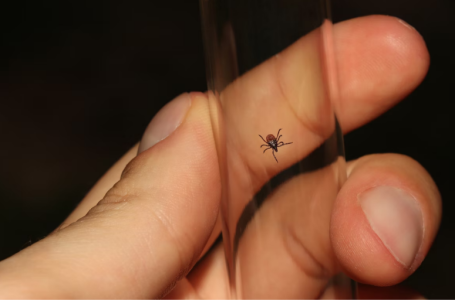Experts urge caution as tick-borne diseases reach alarming levels
- Replies 0
If you’ve spent time hiking, gardening, or simply letting your dog roam outdoors, you’ve likely heard the usual warnings about ticks. But recently, those warnings have grown more urgent.
A lesser-known but rapidly spreading disease called babesiosis is being carried by black-legged ticks and moving beyond its traditional strongholds into Virginia, Maryland, West Virginia, and Washington, DC.
Experts say it’s time to take this threat seriously—even if you’ve only ever worried about Lyme disease.
Babesiosis is caused by a parasite that attacks red blood cells and is transmitted by the same tick that spreads Lyme disease.
“An important public health problem,” said Jorge Benach, a professor of microbiology and immunology at Stony Brook University, noting that it’s particularly dangerous for the elderly, immunocompromised, or people without a spleen.
While some infected individuals may show no symptoms at all, others can develop hemolytic anemia, in which red blood cells are destroyed faster than they can be replaced. This makes early detection critical, especially as the disease expands to new geographic regions.
In healthy adults, babesiosis may cause only mild symptoms—or none at all. But for vulnerable groups, it can be deadly.

“The number of babesiosis cases reported each year has increased over time,” a CDC spokesperson confirmed, with more than 2,000 cases annually, mostly in the Northeast and Midwest.
That number is expected to rise as warming winters and land use changes allow ticks to thrive in new areas.
Symptoms of babesiosis are often vague and can be easily overlooked, especially in early stages. Patients might experience fever, chills, fatigue, muscle aches, nausea, or dark urine—signs that red blood cells are being destroyed.
According to the CDC, anyone developing these symptoms after a tick bite—or even after time outdoors—should seek medical care and mention their possible exposure.
The CDC “does not recommend testing after a tick bite unless a person is experiencing new onset of symptoms,” a spokesperson clarified.
The situation becomes even more complex when patients are infected with both babesiosis and Lyme disease.
“These co infections can be hard to treat and lead to severe symptoms,” said Richard Ostfeld, senior scientist at the Cary Institute of Ecosystem Studies.
While Lyme disease can usually be treated with antibiotics, those same drugs won’t affect the Babesia parasite.
This leads to cases where patients are mistakenly diagnosed with “post-treatment Lyme disease syndrome” when, in fact, the Babesia infection was never treated.
The rise of babesiosis is being driven by multiple factors. Tick habitats are expanding due to climate change and suburban development, bringing people into closer contact with infected ticks.
Meanwhile, the aging population and increased use of immunosuppressive drugs are creating more vulnerable individuals.
Durland Fish of Yale’s School of Public Health warned that babesiosis could become a bigger public health issue than Lyme disease due to its higher mortality rates and growing geographic reach.
Also read: Heart attack deaths are down—but these conditions are now claiming more lives
One underreported danger is the risk to the blood supply. If the disease is not diagnosed and the patient gives blood, “this could affect the blood supply,” said Nicole Baumgarth, director of the Lyme and Tick Borne Diseases Research and Education Institute at Johns Hopkins.
Though blood banks have begun screening for Babesia, undetected cases remain a serious concern, particularly for recipients who are already ill or immunocompromised. Experts are calling for increased vigilance to ensure safety.
You don’t have to avoid the outdoors entirely—just take some smart precautions. Wear long sleeves and light-colored clothing so ticks are easier to spot.
Treat your gear and clothes with 0.5% permethrin, and use EPA-registered repellents on exposed skin.
After spending time outside, do a full-body tick check, paying special attention to hidden spots like underarms, behind the knees, and the scalp.
Also read: Are the medications you take secretly raising your risk of heat stroke? Find out which ones to watch out for
Public health experts are urging more education, better diagnostic tools, and a renewed push for prevention. “The health care community needs to be educated much more widely so that they don’t miss cases,” said Ostfeld.
Yet federal funding for tick-borne disease research is being cut, despite the growing risks. And while Lyme disease vaccines are in development, there’s still nothing to prevent babesiosis.
Medical professionals are now encouraged to test for multiple pathogens in patients presenting with tick-borne illness symptoms.
This approach can help avoid misdiagnoses and ensure proper treatment. As Baumgarth put it, “We currently have no comprehensive strategies to reduce or even assess comprehensively the risk of ticks on human public health.” With tick-borne threats only expected to grow, prevention remains the best defense.
Read next: ER visits tied to a growing parasite concern are on the rise—what to know this season

Have you or someone you know dealt with a tick-borne illness like babesiosis or Lyme disease? What questions or prevention strategies do you want others to know about? Share your thoughts in the comments and help keep your community informed.
A lesser-known but rapidly spreading disease called babesiosis is being carried by black-legged ticks and moving beyond its traditional strongholds into Virginia, Maryland, West Virginia, and Washington, DC.
Experts say it’s time to take this threat seriously—even if you’ve only ever worried about Lyme disease.
Babesiosis is caused by a parasite that attacks red blood cells and is transmitted by the same tick that spreads Lyme disease.
“An important public health problem,” said Jorge Benach, a professor of microbiology and immunology at Stony Brook University, noting that it’s particularly dangerous for the elderly, immunocompromised, or people without a spleen.
While some infected individuals may show no symptoms at all, others can develop hemolytic anemia, in which red blood cells are destroyed faster than they can be replaced. This makes early detection critical, especially as the disease expands to new geographic regions.
In healthy adults, babesiosis may cause only mild symptoms—or none at all. But for vulnerable groups, it can be deadly.

Experts urge caution as tick-borne diseases reach alarming levels. Image source: Marino Linic / Unsplash
“The number of babesiosis cases reported each year has increased over time,” a CDC spokesperson confirmed, with more than 2,000 cases annually, mostly in the Northeast and Midwest.
That number is expected to rise as warming winters and land use changes allow ticks to thrive in new areas.
Symptoms of babesiosis are often vague and can be easily overlooked, especially in early stages. Patients might experience fever, chills, fatigue, muscle aches, nausea, or dark urine—signs that red blood cells are being destroyed.
According to the CDC, anyone developing these symptoms after a tick bite—or even after time outdoors—should seek medical care and mention their possible exposure.
The CDC “does not recommend testing after a tick bite unless a person is experiencing new onset of symptoms,” a spokesperson clarified.
The situation becomes even more complex when patients are infected with both babesiosis and Lyme disease.
“These co infections can be hard to treat and lead to severe symptoms,” said Richard Ostfeld, senior scientist at the Cary Institute of Ecosystem Studies.
While Lyme disease can usually be treated with antibiotics, those same drugs won’t affect the Babesia parasite.
This leads to cases where patients are mistakenly diagnosed with “post-treatment Lyme disease syndrome” when, in fact, the Babesia infection was never treated.
The rise of babesiosis is being driven by multiple factors. Tick habitats are expanding due to climate change and suburban development, bringing people into closer contact with infected ticks.
Meanwhile, the aging population and increased use of immunosuppressive drugs are creating more vulnerable individuals.
Durland Fish of Yale’s School of Public Health warned that babesiosis could become a bigger public health issue than Lyme disease due to its higher mortality rates and growing geographic reach.
Also read: Heart attack deaths are down—but these conditions are now claiming more lives
One underreported danger is the risk to the blood supply. If the disease is not diagnosed and the patient gives blood, “this could affect the blood supply,” said Nicole Baumgarth, director of the Lyme and Tick Borne Diseases Research and Education Institute at Johns Hopkins.
Though blood banks have begun screening for Babesia, undetected cases remain a serious concern, particularly for recipients who are already ill or immunocompromised. Experts are calling for increased vigilance to ensure safety.
You don’t have to avoid the outdoors entirely—just take some smart precautions. Wear long sleeves and light-colored clothing so ticks are easier to spot.
Treat your gear and clothes with 0.5% permethrin, and use EPA-registered repellents on exposed skin.
After spending time outside, do a full-body tick check, paying special attention to hidden spots like underarms, behind the knees, and the scalp.
Also read: Are the medications you take secretly raising your risk of heat stroke? Find out which ones to watch out for
Public health experts are urging more education, better diagnostic tools, and a renewed push for prevention. “The health care community needs to be educated much more widely so that they don’t miss cases,” said Ostfeld.
Yet federal funding for tick-borne disease research is being cut, despite the growing risks. And while Lyme disease vaccines are in development, there’s still nothing to prevent babesiosis.
Medical professionals are now encouraged to test for multiple pathogens in patients presenting with tick-borne illness symptoms.
This approach can help avoid misdiagnoses and ensure proper treatment. As Baumgarth put it, “We currently have no comprehensive strategies to reduce or even assess comprehensively the risk of ticks on human public health.” With tick-borne threats only expected to grow, prevention remains the best defense.
Read next: ER visits tied to a growing parasite concern are on the rise—what to know this season
Key Takeaways
- Babesiosis is a tick-borne disease caused by a parasite that attacks red blood cells and is spreading to new areas in the US, including Virginia, Maryland, and West Virginia.
- People over 50, immunocompromised individuals, and those without a spleen are at higher risk of severe illness or death.
- Coinfection with Lyme disease is common and complicates diagnosis, as antibiotics for Lyme do not work against babesiosis.
- The parasite can be transmitted via blood transfusions, prompting increased screening efforts by blood banks.






